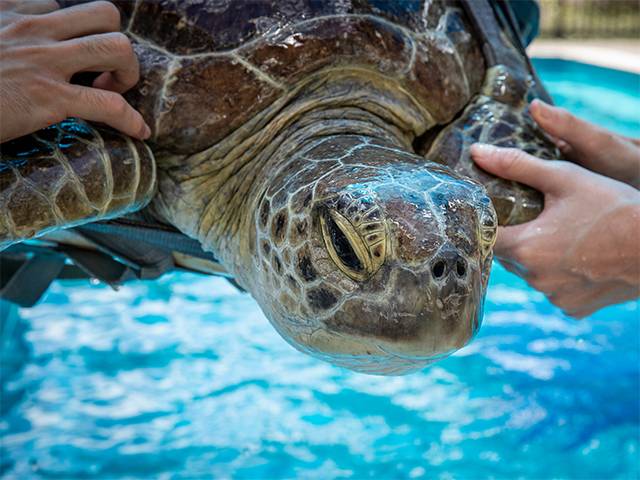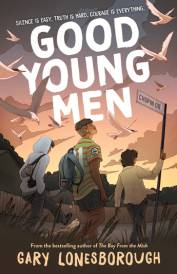Spike in sea turtle admissions, including mystery shell disease in green turtles

The Australia Zoo Wildlife Hospital is busier than ever, having treated 290 sea turtles in the last year and conducting ground-breaking research on a mysterious shell disease discovered in green sea turtles.
Following the devastating floods in Queensland, the Wildlife Hospital was receiving green sea turtles found with ulcerated open wounds on their shells and flippers, often leading to the exposure of the underlying bone. The veterinary team suspects that this is linked to diminishing sea grass availability, and due to low food supply, turtles are consuming a food source which normally contributes to a small part of their diet. In turn, this also causes severe gastrointestinal issues in green sea turtles.
Dr. Ludo Valenza, Hospital Supervisor and Veterinarian, said, "Since November 2021, we have received 76 green sea turtles affected by the disease. Initially, the turtles affected were large adults weighing over 100 kilograms. Then, we saw a number of smaller adults, and now we are back to seeing large adult turtles admitted."
"The investigation into the cause of this disease is still underway, so our aim at the Wildlife Hospital is to treat any secondary infections the turtles are developing as a result of being immuno-compromised."
The Wildlife Hospital, a flagship project of the charity Wildlife Warriors, is working tirelessly with researchers to find a cure for this disease, which is leaving a catastrophic effect on the population of marine turtles.
Most turtles currently in care are suffering from the soft-shell syndrome, including Amani the green sea turtle. She was admitted to the Wildlife Hospital recently, and is responding to her medication well. Amani is recovering in the Turtle Rehabilitation pool and enjoys eating her favourite food, lettuce! Due to the damage caused to her shell from this disease, it will take time for this beautiful turtle to fully recover before she can return to the wild.
The soft-shell syndrome can take months for the affected turtles to heal. Every two to three years, a female turtle will breed and lay, potentially, hundreds of eggs. With only one in 1,000 turtles surviving to maturity, each nest is critical in the survival of this endangered species.
While continuing research for the soft-shell syndrome in green sea turtles, the Wildlife Hospital continues to receive marine turtles from other causes, leaving them vulnerable in their natural habitat.
"We have also seen large turtles admitted after being hit by boats or fishing line ingestion. The natural environment of these beautiful animals is being severely compromised, and I am extremely concerned for their long term survival in the ocean," Dr. Ludo said.
As one of the busiest sea turtle facilities in Australia, the Wildlife Hospital is continually providing the most specialised treatment and care to these animals to give them their greatest chance of survival.
Terri Irwin, Founder of Wildlife Warriors, said, "I am proud of our team at the Wildlife Hospital who are working around the clock to treat the high number of sea turtles being admitted. From the beginning, our goal at Wildlife Warriors has been to inspire and include more people in saving wildlife and wild places. The plight of sea turtles in the wild is alarming, and we need to do everything we can to ensure that the species is protected and around for future generations."
"Some of the sea turtles rehabilitate at the Wildlife Hospital for months, requiring around the clock treatment and care until they are ready to return to the wild. We have now treated over 120,000 animals since opening our doors including more than 1500 sea turtles, and continue to create a better world for wildlife through our conservation efforts across Wildlife Warriors," Terri said.
Besides the Australia Zoo Wildlife Hospital, Wildlife Warriors supports a number of national and international conservation projects to protect animals such as cheetahs, Sumatran tigers, Cambodian elephants, whale sharks, grey nurse sharks, koalas and crocodiles.
The Australia Zoo Wildlife Hospital operates 24 hours a day, seven days a week, treating sick, injured and orphaned wildlife every day of the year.
To find out more about Wildlife Warriors and the conservation projects we support, please visit wildlifewarriors.org.au.
Following the devastating floods in Queensland, the Wildlife Hospital was receiving green sea turtles found with ulcerated open wounds on their shells and flippers, often leading to the exposure of the underlying bone. The veterinary team suspects that this is linked to diminishing sea grass availability, and due to low food supply, turtles are consuming a food source which normally contributes to a small part of their diet. In turn, this also causes severe gastrointestinal issues in green sea turtles.
Dr. Ludo Valenza, Hospital Supervisor and Veterinarian, said, "Since November 2021, we have received 76 green sea turtles affected by the disease. Initially, the turtles affected were large adults weighing over 100 kilograms. Then, we saw a number of smaller adults, and now we are back to seeing large adult turtles admitted."
"The investigation into the cause of this disease is still underway, so our aim at the Wildlife Hospital is to treat any secondary infections the turtles are developing as a result of being immuno-compromised."
The Wildlife Hospital, a flagship project of the charity Wildlife Warriors, is working tirelessly with researchers to find a cure for this disease, which is leaving a catastrophic effect on the population of marine turtles.
Most turtles currently in care are suffering from the soft-shell syndrome, including Amani the green sea turtle. She was admitted to the Wildlife Hospital recently, and is responding to her medication well. Amani is recovering in the Turtle Rehabilitation pool and enjoys eating her favourite food, lettuce! Due to the damage caused to her shell from this disease, it will take time for this beautiful turtle to fully recover before she can return to the wild.
The soft-shell syndrome can take months for the affected turtles to heal. Every two to three years, a female turtle will breed and lay, potentially, hundreds of eggs. With only one in 1,000 turtles surviving to maturity, each nest is critical in the survival of this endangered species.
While continuing research for the soft-shell syndrome in green sea turtles, the Wildlife Hospital continues to receive marine turtles from other causes, leaving them vulnerable in their natural habitat.
"We have also seen large turtles admitted after being hit by boats or fishing line ingestion. The natural environment of these beautiful animals is being severely compromised, and I am extremely concerned for their long term survival in the ocean," Dr. Ludo said.
As one of the busiest sea turtle facilities in Australia, the Wildlife Hospital is continually providing the most specialised treatment and care to these animals to give them their greatest chance of survival.
Terri Irwin, Founder of Wildlife Warriors, said, "I am proud of our team at the Wildlife Hospital who are working around the clock to treat the high number of sea turtles being admitted. From the beginning, our goal at Wildlife Warriors has been to inspire and include more people in saving wildlife and wild places. The plight of sea turtles in the wild is alarming, and we need to do everything we can to ensure that the species is protected and around for future generations."
"Some of the sea turtles rehabilitate at the Wildlife Hospital for months, requiring around the clock treatment and care until they are ready to return to the wild. We have now treated over 120,000 animals since opening our doors including more than 1500 sea turtles, and continue to create a better world for wildlife through our conservation efforts across Wildlife Warriors," Terri said.
Besides the Australia Zoo Wildlife Hospital, Wildlife Warriors supports a number of national and international conservation projects to protect animals such as cheetahs, Sumatran tigers, Cambodian elephants, whale sharks, grey nurse sharks, koalas and crocodiles.
The Australia Zoo Wildlife Hospital operates 24 hours a day, seven days a week, treating sick, injured and orphaned wildlife every day of the year.
To find out more about Wildlife Warriors and the conservation projects we support, please visit wildlifewarriors.org.au.
MORE





